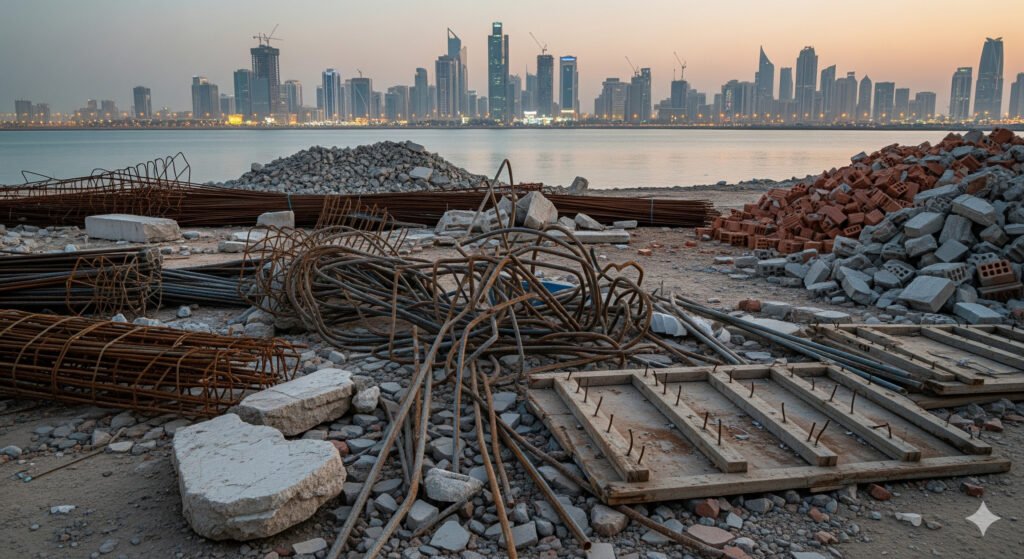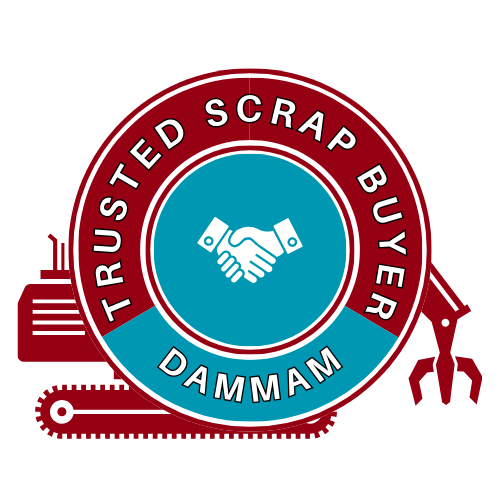
Dammam (Arabic: الدمّام) is the capital of Eastern Province, Saudi Arabia, and among the most populated cities in the country. Thanks to its proximity to ports and well-established industrial base, the city has emerged as one of the biggest scrap markets. There are trading various kind of scrap in Dammam. From the leftovers of the construction process to waste in the automotive industry, it can be recycled at recycling plants, offering both environmental and financial benefits.
Types of scrap in Dammam that are popular and in high Demand
Metal Scrap in Dammam (Ferrous & Non-Ferrous)
- Iron & Steel Scarp: Uses in the construction and manufacturing sector.
- Aluminum Scrap: Widely used in automotive and packaging due to its lightweight & recyclable nature.
- Scrap Copper: extremely valuable in electrical wires, plumbing, and some electronics.
Plastic Scrap
- Demand is high from packaging, household products, and industrial recycling firms.
- PET, HDPE, and LDPE plastics are especially sought after.
Rubber & Tire Scrap in Dammam
- Recycled into rubber composites, fuel, and building materials.
- Sustained Demand from the automobile industry in Dammam.
Electronic Scrap (E-Waste)
- Gold, silver, and copper are some of the precious metals found in old computers, cell phones, and electrical equipment.
- Quick tech updates continue propelling the market growth.
Paper & Cardboard Scrap in Dammam
- Vital for the packing sector and recycled paper production.
- Growing e-commerce and logistics lift Demand.
Other Industrial Scrap
- Wood, glass, and mixed materials from building projects.
- Such materials may be reused as furniture, packaging, or building products
The Best Time of Year to Trade Scrap in Dammam
Scrap recycling in Dammam is available for much of the year, but specific periods may bring higher demand and better rates:
Post-Summer & Early Fall (September – November) :
Businesses get back in gear after a summer lull, stoking demand for raw materials.
Why post-summer and early-autumn (September–November) is one of the optimal times to sell scrap in Dammam:
End of Summer Slowdown
During the summer months, which are the off-peak season in Saudi Arabia, various industries, such as construction and manufacturing, temporarily halt their activities due to intense heat and extended vacations.
“And when business resumes after the summer, it needs to catch up full capacity and the demand for raw material — including scrap and recyclize — surges.”
Construction & Infrastructure Projects Resume
That period (September – November) is a busy time of year for infrastructure and real estate development in the Eastern Province.
The projects could use vast amounts of steel, aluminum, copper, and other metals that can be made from scrap.
Higher Export Activity
As a port city, snowfall results in more nutritious runs of fish, which are also suitable for export.
There is a higher appetite for scrap metals and other recyclable materials from overseas buyers gearing up for end-of-year manufacturing.
Historically, commodities prices globally (and increasingly so metals) are strong in the final quarter as industries around the world ramp up production before the year is out.
This creates a favorable business environment for local traders in Dammam.
In brief: After summer, industries ramp up to full throttle, construction booms, and global demand goes up, an ideal set of conditions for making better money when you cash in scrap.
Pre-Ramadan Season:
Construction and manufacturing activity typically increases before Ramadan, driving up scrap requirements.
Why is pre-Ramadan the best Time for scrap trading?
Pre-Ramadan is considered one of the best times for scrap trading in Dammam (and across Saudi Arabia) because:
Increased Construction & Manufacturing Activity
Before Ramadan, many businesses and contractors speed up their projects to meet deadlines, since working hours are usually reduced during Ramadan. This means higher demand for raw materials like steel, aluminum, and copper—making scrap more valuable.
Stronger Market Movement
Traders, factories, and recycling companies try to stock up on raw materials before Ramadan, as production often slows down during the holy month. This leads to a surge in scrap purchasing activity in the weeks leading up to Ramadan.
Seasonal Demand from Retail & Packaging
The demand for packaging materials (paper, cardboard, and plastics) grows before Ramadan due to the rise in food and retail activities. Pre-Ramadan is regarded as one of the best times for scrap business in Dammam (and Saudi Arabia in general) because:
Price Advantage
Scrap prices typically go up before Ramadan as demand outstrips supply, affording traders and sellers better mark-ups.
Bottom line: The best time to do this is pre-Ramadan, when industries and traders are trying to acquire materials before the significant slowdown and prices on scrap temporarily spike due to heightened demand.
End of Financial Year (December):
Companies unload old inventory and machinery, swelling the market supply of industrial scrap.
Why December is the most delicious month for scrap trading.
The Best Time for Scrap Trading Is December
End-of-Year Industrial Clear-outs
Tons of factories, warehouses, and companies dispose of old machinery, equipment, and unused inventory before the new year starts. That causes a rush of scrap supply — particularly metal, electronics, and industrial waste.
Budget Utilization
Many businesses have their annual budgets run out just before the year ends. This may result in the disposal of obsolete large equipment and in an increase in the purchase of scrap materials for recycling.
Higher Global Export Demand
December is a busy month for international trade, with world markets revving up for year-end production and shipment. Scrap (metals such as steel, aluminum, and copper), which is in greater demand for export now, traders in Dammam are at an advantage to send these materials around the globe with their access through the port.
Better Pricing Opportunities
Another factor is that scrap prices tend to peak in December due to increased activity on both local and overseas markets. Sellers may also fetch higher returns than they would during slower months.
Preparation for New Projects
Factories and companies ordering new construction and industrial projects for the coming year are loading up on raw materials in December. This fuels demand for recycled scrap that can be used in production.
In brief: Dammam’s best scrap trading month is December, when users flush out old stock, exporters push up their demand for material, and prices are often high on year-end activity.
Global Market Influence:
Local Demand is influenced by international commodity prices, especially for metals. It’s more lucrative to trade scrap when the cost of metals is climbing globally.
Why This Moment Is More Lucrative for Scrap Trade
- Rising Global Commodity Prices
A. Scrap prices are directly related to the global cost of steel, copper, and aluminum.
B. When the global markets go up in price, such as closer towards the year-end or industrial seasonal demands, Dammam local traders would receive those higher prices from recycles and stuff because they will be willing to pay more. - High Demand Meets Limited Supply
A. Demand for raw materials surges post the summer, pre-Ramadan, and at year’s end.
Given that supply cannot chase Demand immediately, buyers are willing to quote higher prices for immediate sellers of scrap; thus, it is the season in which sellers enjoy maximum profits.
Export Advantage
B. Port city location at Dammam (can be easily exported)
C. When global Demand is peaking (like December), international buyers buy scrap for higher prices and local traders see more profits. - Seasonal Price Boosts
Unlike smooth months with a flat market, these “hot season” bursts can lead to time-limited price increases due to motivated passengers.
Trading Jon for junk at this time of year might yield 10 to 20 percent more on the margin than in off-peak months.
Long story short: It is more profitable (when global prices + local Demand + export opportunities send scrap values higher, which means traders can sell at a profit).
Conclusion
The scrap market in Dammam is perfect, and it’s a great location to sell scrap items. Between metal, plastic, rubber, and electronics scraps, the sought-after categories still dominate, and between mild to good trading periods are usually in the months post-summer, right until Ramadan. Traders who understand market trends and seasonal requirements can maximize their business by not only saving money but also contributing to the sustainability of a recycling economy, which in turn can foster further growth.
